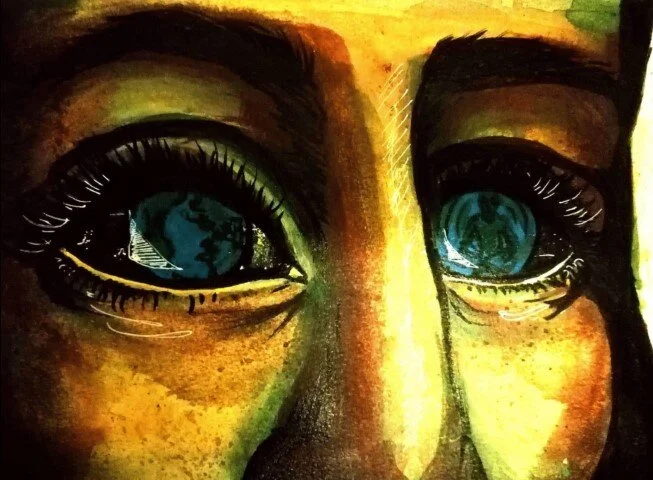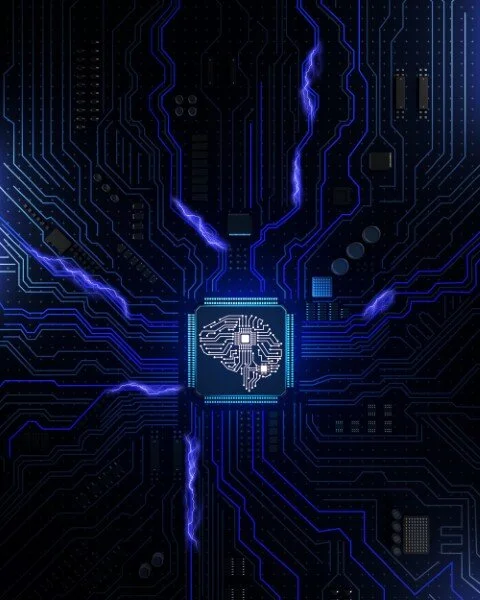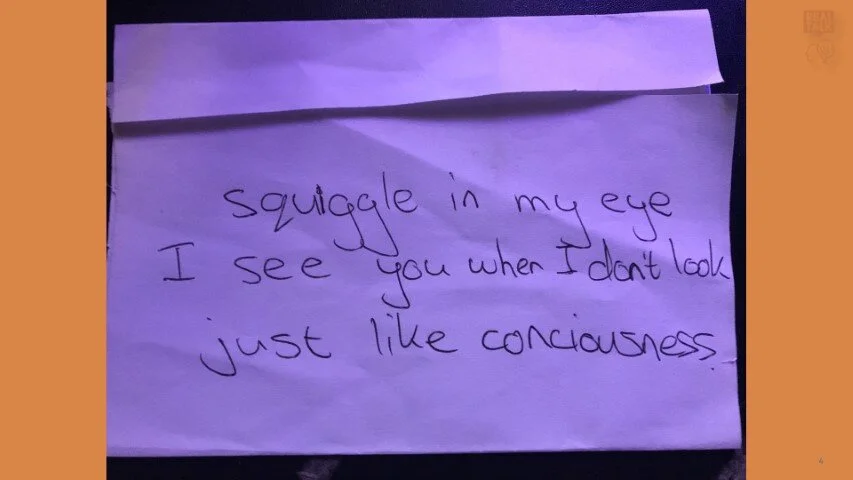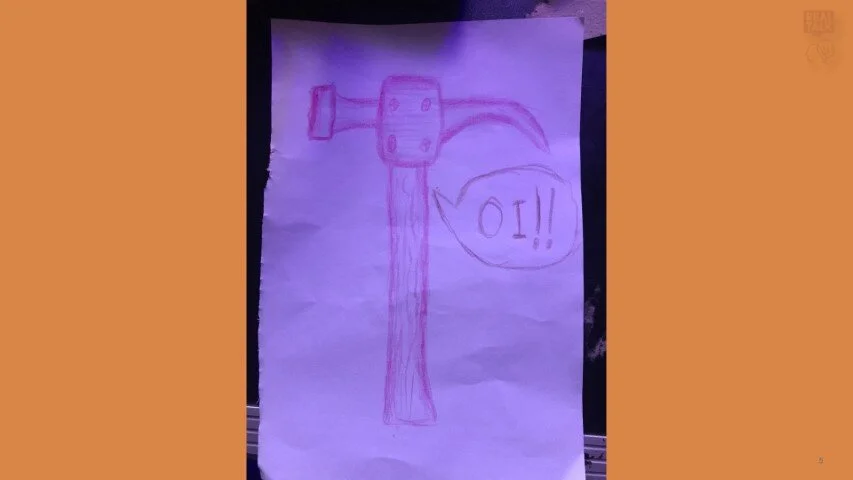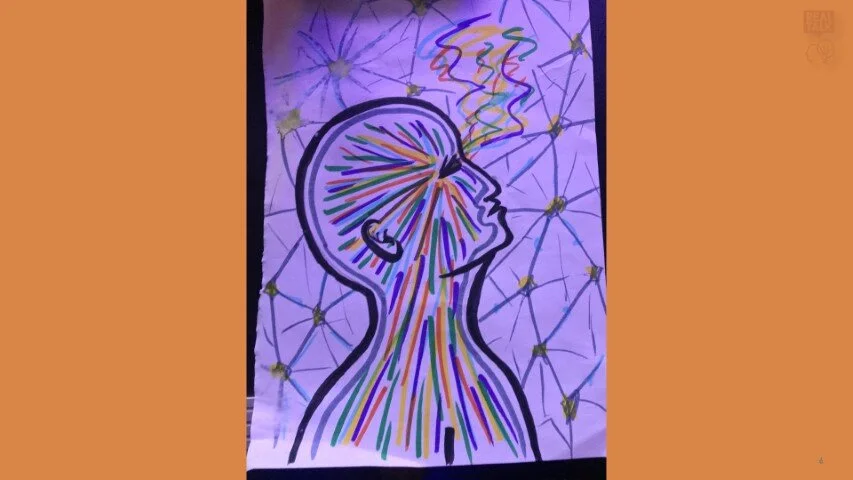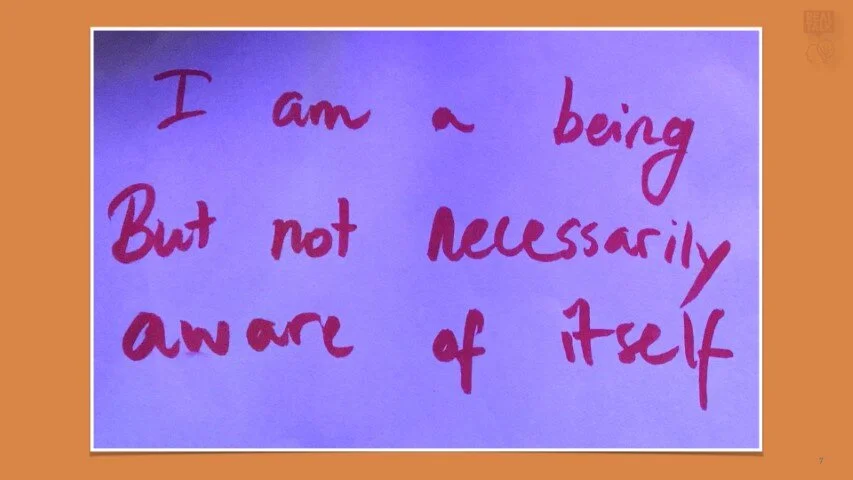Consciousness
Real Talk Philosophy Artwork
Conscience vs. Conscious
People often conflate the terms conscious and conscience.
According to Merriam-Webster dictionary, conscience is “the sense or consciousness of the moral goodness or blameworthiness of one's own conduct, intentions, or character together with a feeling of obligation to do right or be good”
Whereas consciousness is defined in the same dictionary as “"the quality or state of being aware especially of something within oneself"
A definition of the term consciousness is also a bit muddled by having two different but similar meanings. Many people say that chickens are not conscious the way that humans are conscious. And this is why it is morally acceptable to kill chickens, but not humans. Maybe you agree; maybe you disagree. But perhaps we can imagine a chicken going out, and drinking so much it passes out, or “loses consciousness.” Then after a few hours it “regains consciousness.” Even if we don’t believe that the chicken is actually conscious at all. In this sense of the word, consciousness means “awake” or “not passed out.”
But this is not the sense of consciousness that we will explore. We’re talking about a deeper kind of consciousness.
Introductory Discussion Questions
What is consciousness?
Have you had experiences with altered states of consciousness? What does this term mean?
Is there an evolutionary advantage to consciousness?
Can an entity have consciousness and NOT Free Will? Can an entity have Free Will and NOT consciousness?
Is consciousness individual or collective?
Are you your body? Are you experiencing your body?
Could it be possible one day to upload your consciousness to a computer?
Which things are conscious (humans, comatose humans, sleeping humans, non-human animals, fetuses, stones, etc.)
Why Talk About Consciousness?
Before we begin, let us contextualize this conversation by considering why it’s important to talk about consciousness.
Firstly, people often justify eating or not eating animals, aborting or not aborting fetuses, euthanizing or not euthanizing comatose hospital patients, enslaving or not enslaving other humans based on whether or not the subject in question is consciousness. Before we can begin making decisions, then, about abortion or euthanasia or meat-eating, etc., we must first understand what consciousness is.
Another reason it’s important that we understand consciousness is that some philosophers, like Peter Francis Dziuban, have argued that consciousness is all that we are. That our consciousness is shaping the physical world around us. And that we must understand it in order to understand the external world.
For decades it has been suggested that humans will one day be able to defy death and live forever by uploading our consciousness to a computer. Unless we are able to identify exactly what consciousness is, though, we’ll never be able to be certain whether our consciousness has truly been uploaded, or if the computer version of ourselves is just an unconscious robot.
Elon Musk, CEO of SpaceX, has indicated that his primary motivation for founding SpaceX is to “maintain the light of consciousness to make sure it continues into the future." He is concerned about Climate Change and the sustainability of the Earth for mankind. Rather than putting all of our eggs into one basket, we must inhabit other planets to ensure consciousness survives.
Lastly, the continued debate over whether consciousness is universal or individual. The only way to begin answering this question is to first understand what consciousness is.
What is consciousness?
The term consciousness is used synonymously with many other terms such as sentience, awareness, qualia, subjectivity, wakefulness, and soul. These terms all have their own flavor and flair, but are generally related to the same domain.
One of the easiest ways to demonstrate what consciousness or awareness is, is by comparing it to the lack of consciousness or the lack of awareness. Humans seem to have the ability to select which external stimuli to be aware of, to be conscious of. Your heart is beating right now. Your liver and your kidneys are filtering right now. Those processes are being controlled by your brain. But you are unaware of the fact that your brain is controlling these processes, these are subconscious processes. (Sub, meaning “below,” processing on a level below your conscious awareness. So there are clearly some parts of reality that we are aware of, and others that we are unaware of.
Let’s try a little experiment. This is The Awareness Test.
Did you see the bear the first time around? So there are clearly some things that happen right in front of us, that we are simply unaware of, information that is being processed by our eyes, that does not make its way to our conscious processing.
Let’s try one more. This time, you’ll likely have a bit more control. Now, this doesn’t work for everyone, but most people report being able to hear either “Green Needle” or “Brainstorm” depending on which word they anticipate. They can control what they hear with their mind. Let’s give it a try!
This shows that our conscious experience is not necessarily a reflection of reality.
Definitions
Merriam Webster defines consciousness as: "the quality or state of being aware especially of something within oneself", "the normal state of conscious life"
The Oxford Living Dictionary defines consciousness as: "The fact of awareness by the mind of itself and the world.", "The state of being aware of and responsive to one's surroundings."
The Routledge Encyclopedia of Philosophy offers a slightly more complex, comprehensive definition: “Intuitively perceived knowledge of something in one's inner self”, “Sensation, emotion, volition, or thought.”, “Something in nature that is distinguished from the physical.”
We Will Never Understand Consciousness
These definitions often leave eager minds unsatisfied. Based on these definitions, many of you may have no better understanding of what consciousness is.
Some, like Stuart Sutherland in the MacMillan Dictionary. He wrote that: All definitions of consciousness involve circularity or fuzziness. He says that the term is impossible to define except in terms that are unintelligible without a grasp of what consciousness means. How do you describe the color red to someone who’s never seen it? You can’t! And the same may be true of consciousness. Sutherland says that it is impossible to specify what consciousness is, what it does, or why it has evolved, and nothing worth reading has been written on it. Or as Alan Watts writes, “Trying to define yourself is like trying to bite your own teeth.
The Mind-Body Problem
Another way to analyze consciousness is through the lens of the Mind-Body Problem. Put succinctly, the mind problem explores the question: How are mental processes (like consciousness) connected to and interacting with physical processes (like chemicals and synapse firings)? If consciousness is a separate entity, like a soul, how is information communicated to that entity? When you pinch your arm, the nerves just under your skin send electrical signals up to your spinal cord, then to your brain. But it doesn’t stop there. The sensation is then experienced by you.
Cartesian Dualism
This Mind-Body Problem was first discussed by Renes Descartes in the early 17th Century. Descartes argued that two worlds exist: The world of mind (res cogitans) and the world of matter (res extensa). He posited that consciousness resides in the “thought world” and that interaction between the thought world and material world occur in the brain. Perhaps in the pineal gland, although he wasn’t sure. This view, that there are fundamentally two separate entities - consciousness and material, the world of mind and the world of matter - is referred to as dualism.
As asked by 19th century English biologist and anthropologist, Thomas Henry Huxley, “How it is that anything so remarkable as a state of consciousness comes about as a result of irritating nervous tissue, is just as unaccountable as the appearance of the Djin, when Aladdin rubbed his lamp.”
Dualism can be contrasted with Monism. Monism posits that, despite appearances, there is really only one realm of being. Consciousness and physical matter are both a part of the same world . Now, controversially, monism also posits that consciousness and all phenomena can be explained by neural events in the brain. That is, the physical brain exists and is the source of consciousness.
Monism can be contrasted with idealism, which posits that: Nothing exists other than thought and experience. There is no brain. There is no body. There is only thought. Matter is an illusion, created by consciousness.
So, which one is correct? Dualism? Monism? Idealism? Or something else entirely?
That’s for you to decide.
Discussion Question
Are you conscious? Can you prove it?
Why do we tend to value beings with consciousness above those without?
Is it possible to define or discuss consciousness at all?
Is reality made of just matter/energy (Monism), or just Ideas/Perception (Idealism), or a bit of both?
Is intelligence correlated to consciousness?
Do groups (e.g. homo sapiens, Vietnamese, etc.) have their own consciousness?
How is consciousness connected to our personal identity, who we think we are?
When you die, will your consciousness cease to be?
The Problem of Other Minds
A debate that is deeply worth considering is the Problem of Other Minds. In short, the Problem of Other Minds asks: How do we know that anything else is conscious at all? Some of us seem to have intuitions about which things are conscious, and which things aren’t. Most people say that humans are conscious, but rocks are not. Where does this intuition come from? And how exactly do we know that other humans are conscious?
The Problem of Other Minds
The first problem presented in the Problem of Other Minds is that all definitions of consciousness rely on experience. But experience is subjective. That is, it can only be known from the inside of a perceiver. Whether or not Paul McCartney is a musician is objective. That is, there is evidence in the external world that proves that Paul McCartney is a musician. But, whether or not Paul McCartney is a good musician is subjective. That is, there must be someone or something feeling his music internally to assess whether the feelings it brings about are good or bad. Well, consciousness is dependent on experience, and experience is exclusively internal, subjective. Science can not assess whether or not a thing is conscious because science is the study of the objective world, not the subjective world. Therefore, there can not be any external evidence proving whether or not someone or something is conscious, i.e. experience is subjective. Presumption that people and some animals are conscious, but that other things are not.
This raises the question of Philosophical Zombies. The thought experiment of philosophical zombies has been around since about the 1970s. A philosophical zombie is an entity that is physically identical to a human, behaves like a human in every way but lacks consciousness. The question that has been explored by several philosophers is: is such a being even theoretically possible? Is it possible to conceptualize a being that has all the characteristics of a human, the same biology, but no consciousness? A being that looks like a human, walks like a human, speaks like a human, makes jokes like a human, even dies like a human. But with no consciousness inside. Just a kind of robot, a kind of super-advanced computer. If someone were to punch this computer, signals would travel from the impact-location to its central processing unit, it would do some calculations, and it would respond in a complex, human-like way. But there would be nothing experiencing this process. It would be the same as punching your iPhone.
Some philosophers say yes. Philosophical Zombies are conceptually possible. They say that consciousness is separate from human biology. Others say no. They say that human biology necessitates consciousness and that consciousness is an emergent property of complex matter. Like how heat can’t be found in any individual molecule, but is an emergent property of many molecules rubbing together.
We tend to presume that consciousness is in things that are like us in appearance and behavior and conversely we tend to presume that consciousness is not in things that are not like us. There is a chance that you are the only conscious being. There is a chance that everything is conscious. According to Thomas Nagel, who wrote the most influential modern paper on consciousness, “An organism has conscious mental states if and only if there is something that it is like to be that organism.”
Animal Consciousness
Perhaps one of the most important considerations when exploring questions about consciousness is whether or not non-human animals are conscious.
The question of animal consciousness is grounded in The Problem of Other Minds; that is, how can we possibly know whether or not some other being is conscious? Perhaps we are biased to believe that Non-human animals are not conscious. Afterall, they do not look like us, do not act like us, can not tell us about their experience. But what is this presumption grounded in? Why do we make this presumption?
We tend to presume that certain animals (cats, dogs, etc.) are conscious. While other animals (insects, etc.) are not conscious. But the source of this intuition is not obvious. Why do we feel this way?
On the 7th of July, 2012, at the University of Cambridge, a group of scientists presented the Cambridge Declaration on Consciousness. This was before several of the world’s most prominent scientists, including Stephen Hawking. Among many other notable statements, the paper declared that "It's obvious to everyone in this room that animals have consciousness, but it is not obvious to the rest of the world. It is not obvious to the rest of the Western world or the Far East.” and goes on to say that "Convergent evidence indicates that non-human animals [...], including all mammals and birds, and other creatures, [...] have the necessary neural substrates of consciousness and the capacity to exhibit intentional behaviors."
Discussion Questions
Are other people conscious? Can you prove it
Are zombies (human form and behavior without consciousness) theoretically possible?
Why does consciousness exist?
What would it mean to have a higher level of consciousness?
Will it one day be possible to upload your consciousness to a computer (or computer-type machine)?
Will AI ever reach consciousness?
Are non-human animals conscious?
Are all humans conscious, or do some humans lack consciousness?
